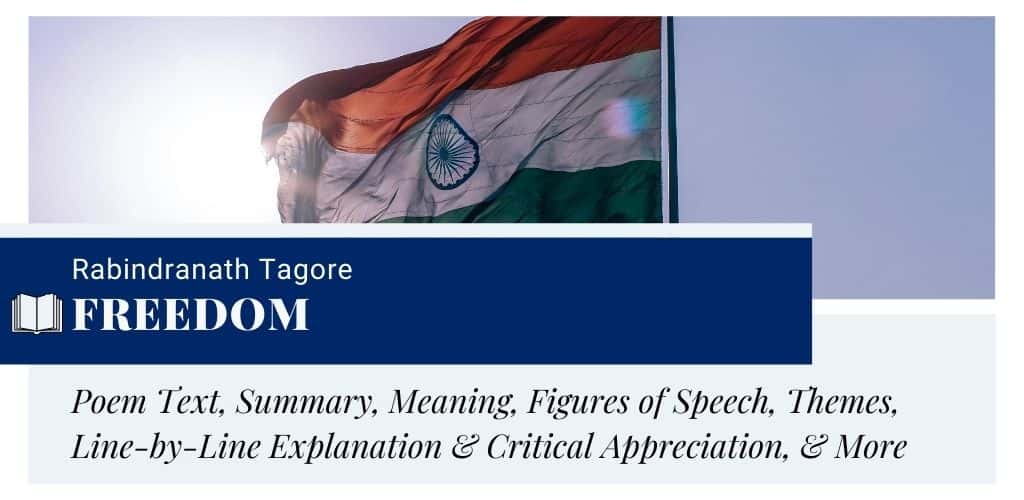Freedom by Rabindranath Tagore
Rabindranath Tagore’s poem “Freedom” is an impassioned address to his motherland, India. This piece explores the importance of freedom in its entirety. It speaks vividly of the oppression and torture that his motherland faced during the colonial era. Tagore portrays the suffering of his countrymen by personifying the country. He projects it as a woman who is bogged down by the burden of shame and subjugation. Through this poem, the poet expresses his idea of the complete freedom of Indians on both internal and external levels. He wants a country where people are not only free from enslavement but also able to think freely.
- Read the full text of “Freedom” below:
Freedom by Rabindranath Tagore Freedom from fear is the freedom I claim for you my motherland! Freedom from the burden of the ages, bending your head, breaking your back, blinding your eyes to the beckoning call of the future; Freedom from the shackles of slumber wherewith you fasten yourself in night's stillness, mistrusting the star that speaks of truth's adventurous paths; freedom from the anarchy of destiny whole sails are weakly yielded to the blind uncertain winds, and the helm to a hand ever rigid and cold as death. Freedom from the insult of dwelling in a puppet's world, where movements are started through brainless wires, repeated through mindless habits, where figures wait with patience and obedience for the master of show, to be stirred into a mimicry of life.

Summary
“Freedom” begins with a direct address to the poet’s motherland. Tagore’s persona wants to see his country free from fear of oppression. The burden of shameful servitude bends her head and breaks her back. It blinds her to future clarion calls. He wants to see his countrymen without the shackles of ignorance or slavery that keep them in darkness. In this situation, they cannot trust the stars that guided humanity from ancient times.
Tagore tells his motherland to be free from destiny’s anarchy. It is like a ship whose sails yield to uncertainty and the helm is controlled by death. Furthermore, he does not want to see her dwelling in a world of puppets where people lack original thinking. They are keen to imitate and satisfied in following their master. In this way, Tagore explores the idea of complete freedom of his countrymen from fear, slavery, ignorance, fatalism, and imitation.
Meaning
As the title says, Tagore’s poem is all about the idea of freedom. This piece explores this topic from the perspective of India and its people during colonial rule. Throughout the poem, Tagore informs his countrymen of the things they have to follow to be free. Firstly, they need to shed fear from their hearts. They should not bow to the cruel blow of the colonizers. Indeed, they have blinded them from the light of hope. Still, they have to trust in themselves.
Their minds should be free from the darkness of ignorance. If they want to be completely free, they need to trust reality rather than fate. Lastly, Tagore metaphorically advises his countrymen not to play a puppet at the hands of colonizers. They have to think on their own in order to realize the value of freedom.
Form, Rhyme Scheme, & Meter
This poem is a free-verse lyric that does not have a regular rhyme scheme or meter. It contains a total of 17 lines grouped into a single stanza. Some lines are short while the others are comparably long. Tagore uses internal rhyming by repeating similar sounding words within a line. For example, in the lines “Freedom from the burden of the ages, bending your head,/ breaking your back, blinding your eyes to the beckoning”, the “b” sound is repeated. It occurs throughout the poem. Apart from that, there is not a specific metrical scheme. It is mostly composed of a combination of anapestic and iambic feet.
Poetic Devices & Figures of Speech
Tagore uses the following figures of speech in his poem “Freedom”.
- Apostrophe: In the first kine, Tagore evokes the spirit of his motherland by personifying it.
- Enjambment: It occurs throughout the poem. Tagore uses this poetic device in order to connect lines internally. For example, it occurs in lines 3-5. One must read the lines quickly to understand the idea.
- Alliteration: The repetition of the same sounds at the beginning of neighboring words can be found in “Freedom from fear”, “my motherland”, “shackles of slumber”, etc.
- Personification: In this poem, Tagore personifies his motherland as a woman chained to servitude. He also personifies the “star” and “destiny” in the following lines.
- Metaphor: This device is used in “burden of the ages”, “shackles of slumber”, “truth’s adventurous paths”, etc. For example, in “burden of the ages”, Tagore compares the burden to his countrymen’s slavery to colonizers.
- Irony: It occurs in the line “Freedom from the insult of dwelling in a puppet’s world”. Here, the poet ironically refers to his countrymen as mere puppets of the colonizers.
Themes
In this poem, Tagore explores the themes of freedom, slavery, ignorance, originality, blind obedience, and suffering. To begin with, the poet seeks a country where everyone can live fearlessly and have complete freedom for their spiritual and emotional growth. He talks about the fear of the colonizers’ brutality. In the following lines, he taps on the theme of slavery. He depicts an image of an individual who is on her knees for the burden of shame and oppression. She is also blinded to hope and truth.
Furthermore, Tagore showcases how ignorant his countrymen are. They are content with darkness rather than following the path of truth. By depicting the country as a “puppet’s world”, the poet presents the theme of blind obedience and lack of originality. Last but not least, the central idea of this piece is complete freedom on a mental, spiritual, and political level.
Line-by-Line Explanation & Critical Appreciation
Lines 1-5
Freedom from fear is the freedom
I claim for you my motherland!
Freedom from the burden of the ages, bending your head,
breaking your back, blinding your eyes to the beckoning
call of the future;
Tagore begins this piece by evoking the spirit of his country. He personifies it as a mother who has given birth to him. In the very first line, he presents an important idea. According to him, “freedom” truly makes sense when the mind is without fear. Fear is an evil spell that blinds one to the light of hope and makes the spirit tremble in lack of confidence. In order to be completely free, his country needs to be fearless like the eagle soaring high in the sky, afraid of the powerful gust.
It is important to note that here “motherland” is a metonym for his countrymen. The variety of metonymy used here is “container for the thing contained”. As we can see there is an exclamation mark at the end of the second line. So, the first two lines form an apostrophe as well as a rhetorical exclamation.
After the impassioned address to his country, Tagore’s poetic persona describes the servitude to the British rule. He describes the enslavement of his country with the use of a visual image. It shows a mother burdened with shame for ages. By “ages”, the poet refers to the term of colonial rule in a hyperbolic manner.
The colonizers have made her bow that remained straight in pride previously. Being a mother of exceptional sons and daughters, she never yielded to their torture easily until they broke her back. They even blinded her to the clarion call of a hopeful future. Being blind, she cannot find the way that will lead to her freedom.
Lines 6-8
Freedom from the shackles of slumber wherewith
you fasten yourself in night’s stillness,
mistrusting the star that speaks of truth’s adventurous paths;
In the sixth line, “shackles of slumber” is a metaphor for ignorance. ‘Slumber” symbolizes one’s ignorance of the truth. While the term “shackles” hints at slavery. So, Tagore’s countrymen are tied with shackles of enslavement. They are marooned from the path of freedom due to their ignorance of the light of hope.
However, the poet ironically comments on the fact that it is not the colonizers who tied the “shackles of slumber” on their feet. Rather Indians have accepted the shackles of ignorance. They have fastened themselves by these chains. For this reason, there is “night’s stillness” in their hearts. Here, “night” is a symbol of ignorance. Ignorance leads to lethargy, hopelessness, and immobility. These qualities can be found in his countrymen.
Furthermore, the poet says they are so unconscious that they cannot even see the stars that have guided humankind for ages. The polestar that speaks of the adventurous paths of the truth, seems a mere dot in their gloomy sky. Here, the poet symbolizes the polestar as truth. He depicts one’s happiness in finding the truth by the phrase “truth’s adventurous paths”. The path is indeed adventurous as it teaches us several things. Only we have to be mentally strong enough to walk on the path of truth.
Lines 9-11
freedom from the anarchy of destiny
whose sails are weakly yielded to the blind uncertain winds,
and the helm to a hand ever rigid and cold as death.
In the following line, Tagore talks about man’s destiny. Destiny means the development of events that are outside our control. So, the poet describes it as a state of anarchy where people are free to do anything in the absence of authority. When a person’s mind is kept free without the reins of consciousness, it can cause disastrous effects in his life. Likewise, believing solely in the unseen future is like keeping the mind loose to do whatever it wants.
Tagore compares destiny to a ship metaphorically. Its sails are weakly yielded to the winds. The winds, being blind of their destination, can lead the ship to any place. Furthermore, destiny’s helm is always vested in the hands of death. The poet uses a simile in order to compare the rigidity and coldness of the helmsman to death. Besides, the term “cold” is a symbol of passivity and “rigid” symbolizes cruelty. By using this metaphor, the poet depicts the cruel and passive nature of death.
Lines 12-14
Freedom from the insult of dwelling in a puppet’s world,
where movements are started through brainless wires,
repeated through mindless habits,
In the next few lines of “Freedom”, Tagore refers to the blind obedience of his countrymen. He wants to free their minds by showing them the reality of blind servitude to anyone. According to him, his country is filled with humans in the form of puppets. It is an insult to live as a mere representation of human beings. Those who cease to think or act on their own, become dead in their minds.
The poet describes their mental enslavement to the colonizers in the next lines. He refers to their movements that begin through “thoughtless wires”. Here, Tagore is referring to the wires that control the puppets. This phrase contains a personal metaphor. Here, the “wires” stand for the nerves that give signals to the body as well as the mind. As the people have turned into wooden dolls, their brains have also stopped working. They are now totally dependent on their masters.
Their movements are repeated through “mindless habits”. It means by repeating the course their masters taught them, has now become their habit. They are unmindful of the fact that it is a form of mental enslavement, more effective than enslaving one physically. It needs little effort to control one’s subjects when their minds are blind, ignorant, and totally dependent on others.
Lines 15-17
where figures wait with patience and obedience for the
master of show,
to be stirred into a mimicry of life.
In the next line, the poet does not refer to them as humans. He feels it more appropriate to call them “figures” lacking originality, self-respect, and confidence. They eagerly wait with patience and obedience for their masters. The poet refers to their life as a puppet show and the colonizers as the “master” of it. They direct them to what do not and whatnot. By following them for a long time, now they cannot even step further without the assistance of their “brainless wires”.
The last line contains an ironic idea. Tagore refers to their life as a form of “mimicry”. It means the actions of his countrymen are imitating what they have learned from their colonial masters. Besides, this term is also used to satirize their mental lameness and spiritual blindness. They cannot feel or see what their masters have done with them.
So, the poet wants them to realize why he is ridiculing them. If they can understand it, their country and most importantly they will entirely be free from enslavement, physically and mentally.
Historical Context
Rabindranath Tagore’s “Freedom” was written during the colonial era when his country was in servitude to the British rulers. Through writing this piece, Tagore wanted to make his countrymen realize what freedom really means. This poem was written in the late 19th century. He firmly opposed British imperialism and supported the Indian nationalists. His views on nationalism were recorded in this poem. At the time, he was in his twenties. Later, he was disillusioned with the form of nationalism in India and became an ardent supporter of internationalism.
Questions & Answers
In this poem, Rabindranath Tagore is propagating the idea of the entire freedom of his country as well as his countrymen. For the sake of the overall development of an individual, one needs to be free from fear, oppression, subjugation, ignorance, and blind obedience. His motherland will be free when its people free their minds from the clasps of colonizers.
The poet wants freedom for his country as it has been tortured for ages. The imperialist rulers have ransacked resources from his motherland and blinded her to hope and freedom. In order to free her from the shackles of shame, he wishes to infuse the spirit of his countrymen by satirizing their flaws.
Tagore wrote this poem when he was in his twenties. It was written somewhere in the late 19th century.
Through this poem, Tagore wants to convey a harsh, yet important message to his countrymen. He shows them their blindness and ignorance to the fact that they are playing mere puppets at the hands of their colonial masters. In order to be free, they need to be original in their thinking. They must stop blindly obeying those who made their motherland suffer.
The tone of this poem is sad and grief-stricken in the first few lines. It changes to an ironic one when the poet starts counting the flaws of his countrymen. In the end, the tone of the poem reflects the poet’s hidden agony, anger, and desperation.
The phrase “burden of the ages” means the enslavement of his countrymen to the imperial rulers. Tagore’s motherland has been bearing this burden of shame and servitude for nearly a century.
The poet wishes to free his motherland from the “burden of the ages” since it has made her bow her head and damaged her back. It is a reference to the effect of colonial rule on his motherland. He wants to see his country in its previous glorious state.
The “beckoning call of the future” refers to the indication of future hope. By using this phrase, Tagore describes how his countrymen are deaf to the clarion call of the future. Their hopelessness and blind servitude to the colonial masters have made them deaf to the future’s call.
Tagore uses the concept of freedom in order to explore its role in a country whose people are blind to the truth, unmindful of their actions, and ignorant of their country’s deterioration.
In the first few lines, the poet uses visual imagery in order to portray his country’s poor state and its fear of the oppressor’s cruel blows. He also makes use of organic imagery to convey his internal feelings of agony and shame to readers. Furthermore, he uses kinesthetic imagery in the lines “whose sails are weakly yielded to the blind uncertain winds” and “where movements are started through brainless wires”. He uses this imagery to depict the movement of sails and the puppets respectively.
Firstly, Tagore personifies his country as a poor, suffering mother. He does so to vividly depict the condition of his motherland. Throughout the piece, he uses several metaphors throughout the poem to explore the importance of freedom in relation to his country’s circumstances.
In this poem, he symbolizes the “star” speaking of “truth’s adventurous paths” as “freedom”.
According to Tagore, freedom of the self comes when one is free from the shackles of ignorance and blind obedience to their masters. The poet visualizes a state of total freedom of his countrymen on a mental, spiritual, and political level.
Explore More Rabindranath Tagore Poems
Similar Poems about Freedom
- “Freedom to the Slave” by Henry Louis Vivian Derozio — This poem centers on the theme of slavery and explores what freedom means to a slave.
- “The Bird Sanctuary” by Sarojini Naidu — In this poem, Naidu describes the essence of freedom that lingers in the sanctuary of nature.
- “The Vagabond” by Robert Louis Stevenson — This piece questions the conventions. It depicts the unrefined freedom Stevenson feels in the bosom of nature.
External Resources
- Check Out Greatest Works of Rabindranath Tagore (Deluxe Hardbound Edition) — A compilation of Tagore’s literary masterpieces, this collection includes his incredible short stories, his most lauded Gitanjali, and much more.
The Poem Aloud — Listen to the poem aloud. - About Rabindranath Tagore — Read about the poet’s life and his works.
- Poet Profile & Poems of Rabindranath Tagore — Learn more about the poet and explore his well-known poems.
- Nationalism by Rabindranath Tagore — Read the essays of Tagore in order to understand his thoughts on nationalism.
- Amartya Sen on Rabindranath Tagore — Read this article of Sen to know his views about Tagore.




Questions and answers should be some more. Also essay type questions.